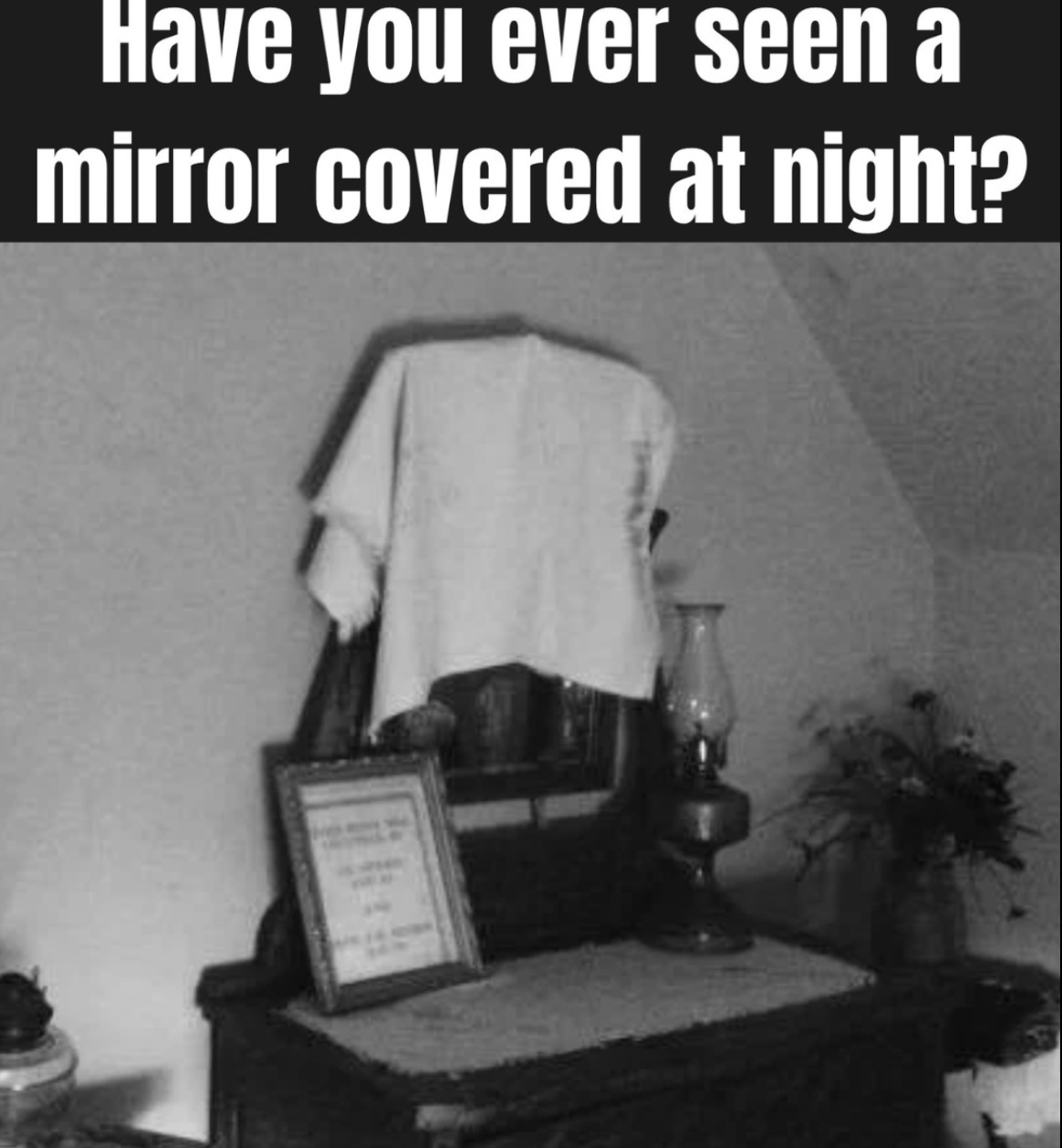Mirrors are powerful tools — not just for checking your outfit, but for affecting your mental state.
In psychology:
Mirrors can cause anxiety in low-light conditions (hello, midnight self-checks)
Reflections in dark rooms can create distorted images that unsettle the brain
Some people report waking up to see their own reflection moving slightly out of sync
This phenomenon, known as the « strange face in the mirror » effect, has been studied by psychologists like Giovanni Caputo — who found that staring into a mirror in dim light for too long can trigger visual distortions and even hallucinations.
So while it may sound dramatic…
There’s some science behind the unease.
🌑 Cultural & Superstitious Roots – Mirrors as Portals
Across time and traditions, mirrors have held a special place in myth and mystery.
1. Jewish Tradition
In Judaism , mirrors are covered during Shiva , the seven-day mourning period after a death.
Why?
To prevent vanity and distractions from grief
Some believe the soul is vulnerable after death — and mirrors could trap it
Covering them becomes an act of respect — and protection.
2. Feng Shui & Energy Flow
In Feng Shui , mirrors are believed to bounce energy — good or bad.
At night, when your body and mind are resting…
A mirror facing the bed can reflect your energy back in ways that disrupt sleep.
Some Feng Shui experts suggest covering or removing bedroom mirrors if they’re directly opposite your pillow — because rest should be deep, not haunted by your own gaze.
3. Slavic Folklore
In parts of Eastern Europe , mirrors were seen as more than just glass — they were gateways to other worlds .
Leaving them uncovered at night meant:
Spirits could pass through
Your reflection could be stolen
Bad luck could follow you into dreams
Some families would drape mirrors with red cloth — a color believed to offer spiritual protection.
4. Vampire & Supernatural Lore
If you’ve ever heard that vampires don’t cast reflections…
Well, some legends say mirrors are also where vampires, demons, and shadow creatures hide — especially at night.
Covering them is a way to keep those entities contained — or at bay.
(Yes, this one’s more fun than functional — but hey, it makes for great bedtime storytelling.)
💤 How Covering Mirrors Can Improve Sleep
Even if you’re not into ghosts or ancient rituals…
There might be a practical reason to try this trick.
Some sleep experts suggest covering mirrors or removing reflective surfaces from bedrooms to improve rest.
Why?
Mirrors bounce light — disturbing melatonin production
They can create unsettling reflections in the dark
For sensitive sleepers, mirrors might subconsciously increase alertness
Try it yourself:
Drape a scarf or cloth over the mirror
Remove reflective objects from view
See if your sleep feels calmer, deeper, more grounded
You might be surprised.
🧼 Final Thoughts: Sometimes the Simplest Things Hold the Deepest Meaning
We often forget that the things we surround ourselves with aren’t just functional — they carry weight, symbolism, and sometimes, history.
Covering mirrors at night might seem odd at first — like something out of a horror movie.
But maybe it’s not about fear.
Maybe it’s about rest .
About reverence .
About protecting your peace while you sleep.
So next time you settle into bed and glance at your dresser, your bathroom door, or the hallway mirror…
Pause.
Ask yourself:
“Do I really need to be looking back at me while I dream?”
Because sometimes, the best way to wake up refreshed…
Isn’t through positive affirmations or white noise machines.
It’s through a little darkness.
A little mystery.
And a simple piece of fabric between you and the glass.
And once you do?
You might just sleep better — or at least feel less watched.
